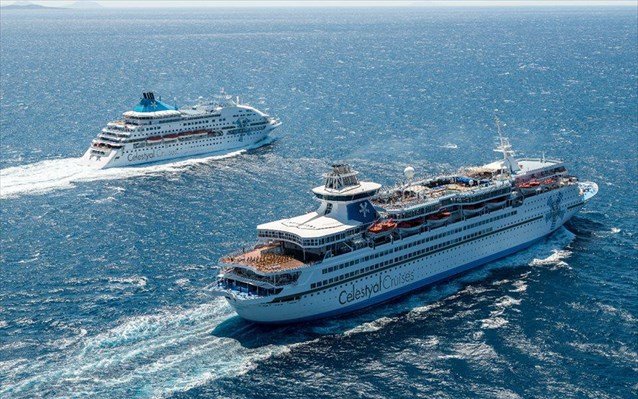
Is the cruise sector ultimately a problem for some very popular destinations, is it responsible for overtourism, or is this view wrong?
This question was also raised at the 7th Posidonia Sea Tourism Forum which took place in the middle of the week in Thessaloniki.
Cruise ship arrivals in Thessaloniki up tenfold compared to 2019
And in Greece this question mainly concerns Santorini and Mykonos, and on a regional level it concerns Venice, and destinations that occasionally record an excessive number of cruise ship arrivals during the course of a single day.
Industry representatives
However, as expected, industry representatives estimated that the cruise sector is not responsible for any overtourism phenomena. They emphasized that where there is a problem of multiple simultaneous approaches there is the necessary flexibility on the part of the companies to adjust the itineraries of the ships.
At the same time, they defended the industry’s non-liability by giving examples. As mentioned there was a weekend in Venice that had 200,000 tourists and only one cruise ship and that with only 900 passengers.
The cruise industry makes up just 2% of the global tourism industry, another speaker said.
However, the President of the Cruise Lines International Association (CLIA) and CEO of MSC Cruises Pierfrancesco Vago, in his speech at the 7th Posidonia Sea Tourism Forum, was clear. I also hear and read various articles, he said, but added that this is a misconception about overtourism from the cruise sector.
Mr. Vago argued that as an industry “we are always ready to deal with critical issues and find solutions,” and gave the example of the Acropolis of Athens.
Tour operators and cruise lines, he said, are working together to coordinate visit routes and ensure there is no overcrowding or parking congestion at this world-famous monument.
The president of the Cruise Lines International Association (CLIA) to dispel any concerns, further emphasized that cruising is a healthy and profitable investment for coastal communities as six out of 10 cruise travelers return, to the places they visited as part of a cruise, for a longer stay .
He even predicted more growth in the future as CLIA research shows that the intention to go on cruises is higher today than it was before the pandemic. 85% of people who have cruised in the past are likely to cruise again – 6% higher than in 2019.
Benefit to local economies
And to leave no room for doubt he “attacked” the “deniers” that have “billions”. The cruise industry benefits local economies here and across Europe, he stressed.
In 2021, and despite the health restrictions the cruise industry had a positive economic impact of €41 billion across the continent, supporting 315,000 jobs in Europe.
Specifically in Greece, the economic benefit exceeded 1 billion euros, while it created more than 15,000 jobs in the country. In Greece today, the economic benefits from tourists arriving on Greek shores by cruise ships are already higher than in 2019.
This is partly due to the significant work of local authorities to increase homeporting infrastructure and services in Greece, according to Mr. Vago.
Last year, of the 87 CLIA cruise ships operating in Greece, 47 had a port of embarkation (homeporting) in Greek territory (54%).
Homeporting brings the greatest financial benefits to any destination.
It increases the time tourists spend ashore both pre- and post-cruise, including demand for accommodation near the port of embarkation.
There are also the benefits of the wealthier passengers spend during their stay, including services, dining, entertainment and shopping.
Each cruise tourist usually spends more than 400 euros at the port of embarkation, while the amount they spend in ports they visit during the cruise is estimated to be at least 100 euros per passenger.
The supply, maintenance and refueling of ships is of course in addition to all of these and results in more jobs at ports of embarkation.
Finally, the president of Clia referred to the industry’s efforts to “go green” by using alternative fuels and generators for cruise ships from land when they are in ports.
Latest News

European Central Bank Cuts Interest Rates by 25 Basis Points
It is the fourth cut of interest rates by Europe’s central bank, a move expected by the markets and financial analysts leading to the rate settling at 3%.

Airbnb: New Measures Add €600 in Extra Costs for Property Owners
Property managers face an immediate administrative fine of 5,000 euros if access to the inspected property is denied or any of the specified requirements are not met.

Economist: Greece Included in the Best Performing Economies in 2024
Meanwhile, Northern European countries disappoint, with sluggish performances from the United Kingdom and Germany.

EasyJet Expands Its Routes from Athens
The airline’s two new routes will be to London Luton and Alicante and they will commence in summer 2025.

Capital Link Forum Highlights Greece’s Economic Resurgence; Honors BoG Gov Stournaras
Capital Link Hellenic Leadership Award recipient, Bank of Greece Gov. Yannis Stournaras, an ex-FinMin, was lauded for his pivotal role during Greece’s economic recovery

Tourist Spending in Greece Up by 14%, Visa Card Analysis Shows
Greece’s capital Athens emerged as the most popular destination, recording a 17% increase in transactions with Visa cards, surpassing even the cosmopolitan island of Mykonos.

Inflation in Greece Unchanged at 2.4% in Nov. 2024
The general consumer price index (CPI) posted a 0.4% decrease in November compared to the previous month

2024 Christmas Holidays: Extended Shop Hours Schedule
The 2024 Christmas Holidays extended shop hours schedule commences on Thursday, December 12 and runs until the end of the year.

ELSTAT: Seasonally Adjusted Unemployment Down in October
The number of employed individuals reached 4,284,694, an increase of 67,723 compared to October 2023 (+1.6%) and 22,002 compared to September 2024 (+0.5%).

Greek PM’s Chief Economic Adviser Resigns
In the post on his Facebook page, Patelis did not disclose the reasons that led him to step down.













![Fraport: Πάνω από 35 εκατ. επιβάτες στα αεροδρόμια το 11μηνο – Πτώση στη Μύκονο [πίνακας]](https://www.ot.gr/wp-content/uploads/2022/06/fraport-90x90.jpg)















![Wall Street: «Τρελάθηκαν» τα νούμερα – Οι αιτίες της ανόδου [γραφήματα]](https://www.ot.gr/wp-content/uploads/2024/11/trump-wall-600x400.jpg)









![Fraport: Πάνω από 35 εκατ. επιβάτες στα αεροδρόμια το 11μηνο – Πτώση στη Μύκονο [πίνακας]](https://www.ot.gr/wp-content/uploads/2022/06/fraport-600x375.jpg)


 Αριθμός Πιστοποίησης Μ.Η.Τ.232433
Αριθμός Πιστοποίησης Μ.Η.Τ.232433